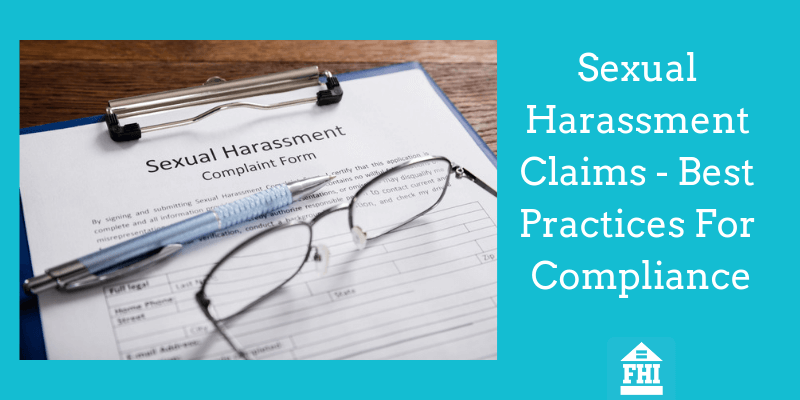
Sexual Harassment Allegations
Sexual harassment allegations are a serious matter. The Department of Justice and HUD are working together in a task force to investigate and prosecute cases of sexual harassment in housing.
As serious (and expensive) as allegations of sexual harassment are for employers, housing providers have even wider concerns since housing providers need to adopt policies and best practices to prevent their employees from causing sexual harassment violations against both coworkers and residents.
During the past two years, multiple cases of sexual harassment against residents have been filed against housing providers throughout the country. Most of these sexual harassment in housing cases resulted in huge damage awards.
Obviously becoming a high-profile case is the last thing a property management company wants. This post will remind you of the absolute necessity to have policies and protocols in place to protect your employees and your residents.
What is Sexual Harassment in Housing?
Sexual harassment in housing includes any unwanted sexual advance, request for sexual favors, or other unwelcome verbal or physical conduct of a sexual nature. Sexual harassment can occur to any person, male or female, and can be committed by someone of the same sex or someone of the opposite sex.
Too Friendly?
It is not uncommon for sexual harassment allegations to arise within fair housing complaints. While the actions of the companies prosecuted by HUD and DOJ referenced above appear to be egregious and extreme, even less serious actions can result in allegations of sexual harassment.
For example, a maintenance employee of an apartment community commented upon the beauty of a single female resident and her young daughter. After the resident was given notice that her lease was being terminated, the resident reported the incident to the property manager, complaining that the maintenance employee had sexually harassed her and her daughter because he was trying to “hit on” them.
Although the maintenance employee’s comments probably would not ultimately be enough to make a case for sexual harassment, all employees should be cautioned against making remarks to applicants or residents that could be used against them as sexually offensive.
Since it is difficult to determine what another person might find offensive, employees should simply refrain from overly familiar or personal comments to applicants or residents.
In situations where it is the resident who is being overly friendly to an employee, management companies should be prepared to institute protective measures to protect the employee from being alone with the resident. Should the resident feel rejected by the employee, he/she may be motivated to make false allegations against the employee.
In order to hold management responsible for sexual harassment allegations, in most situations the person being harassed must prove that management either knew or should have known of the problem. This requirement protects management from being held responsible when it did not have the opportunity to correct the problem.
To avoid successful allegations of sexual harassment we suggest management take the following steps:
5 Recommended Steps
How To Prevent Sexual Harassment Claims
Contact Person(s)
All employees and all residents should be informed of the person within the company to contact with any allegations of harassment, sexual or otherwise. There should be a second person also named, in case the allegation is against the first contact person.
Conduct An Investigation
If an applicant or resident complains that the statements or actions of an employee are offensive (even if the term “sexual harassment” is not used), regardless of the expected outcome, management should immediately conduct an “investigation” of the matter.
Document Interviews
An investigation includes interviewing all relevant parties, documenting the interviews, and responding to the complainant in writing.
Take “Appropriate Action”
If the investigation shows that the employee’s conduct was offensive or a violation of company policy, appropriate action should be taken with the employee and documented. What “appropriate action” is will depend upon the seriousness of the conduct, but it could include counseling by a supervisor documented with a written admonishment, suspension, change of job assignments, required sensitivity training, or even dismissal.
Document the File
If the investigation does not substantiate the allegations of the complainant, the file should be documented with a statement by the supervisor of why it appears the allegations were without merit, and an appropriate letter should be sent to the person who made the complaint.
Provide Regular Training and Reminders
The best way to avoid sexual harassment problems is to conduct regular sensitivity and fair housing training for all employees that includes examples of the kinds of statements and actions that can create sexual harassment issues.
Supervisors should also be sensitive to the actions of employees and individually counsel employees that are “overly friendly” or aggressive toward applicants or residents. If companies have policies discouraging employees from socializing with residents, employees should be reminded of these policies annually. It is a best practice during the annual training to also require each employee to sign a statement that sexual harassment is illegal and the employee understands sexual harassment is a violation of company policy that will likely result in termination.
While many of the legal actions filed are without merit, it only takes one legitimate sexual harassment case to devastate an apartment community and its management company. The time to prevent these situations is prior to their occurrence.
